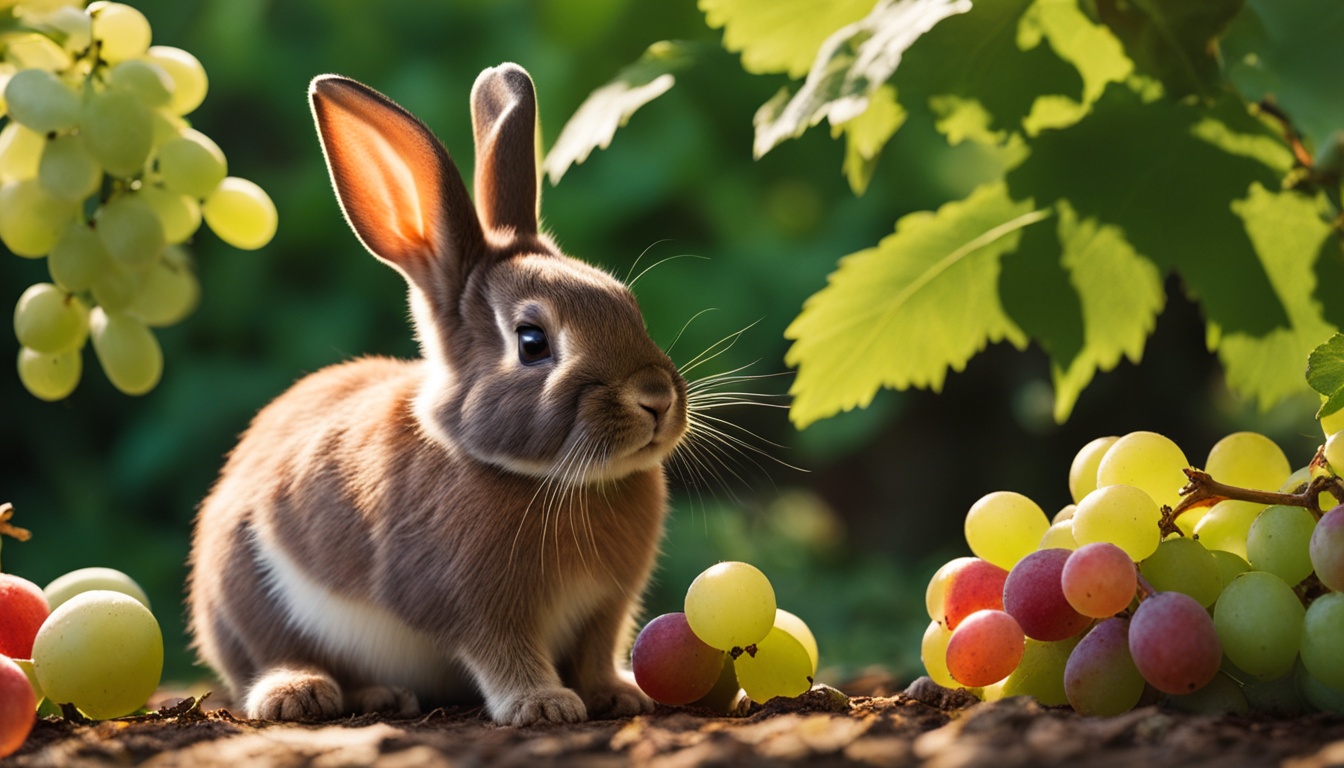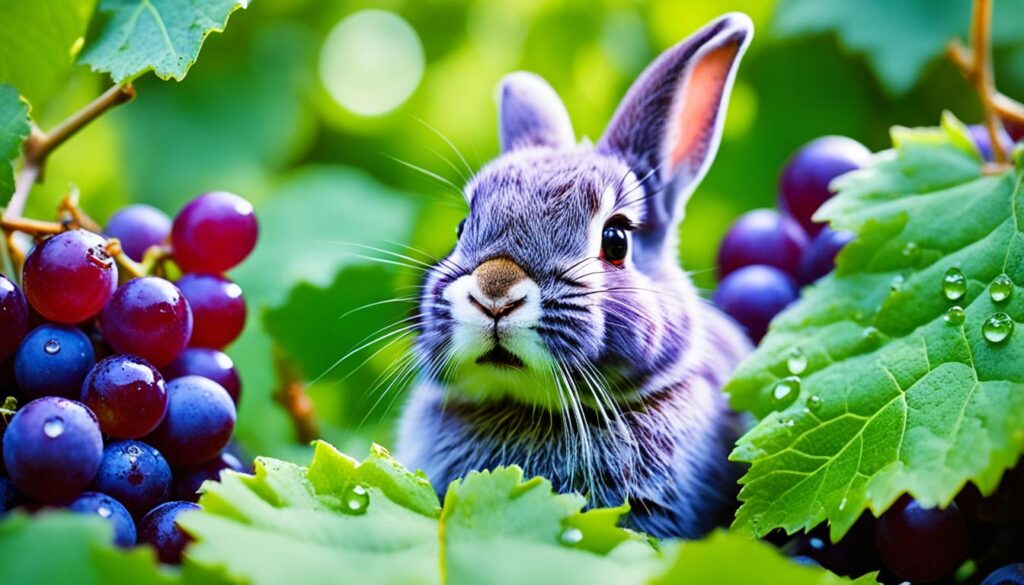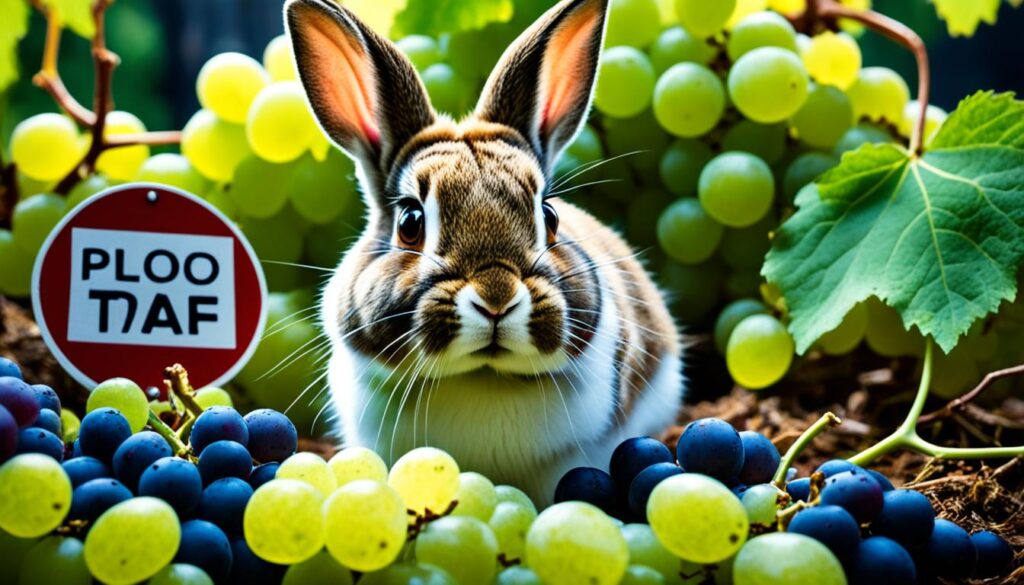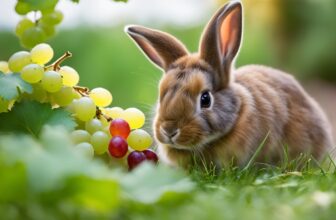Can a Bunny Eat Grapes? Safe Treats for Rabbits

As pet owners, we often wonder about the safety and nutritional value of various foods for our furry companions. When it comes to rabbits, the topic of grapes often sparks curiosity and debate. Can bunnies safely indulge in this sweet fruit, or are there potential health risks to consider? Unraveling the truth behind this query is crucial for ensuring the well-being of our beloved rabbit friends.
Key Takeaways
- Grapes contain some beneficial nutrients for rabbits, including fiber, B vitamins, and vitamin K.
- Rabbits can consume grapes occasionally as a treat, but moderation is key to avoid digestive issues.
- Overconsumption of grapes can lead to weight gain, potential diabetes, and life-threatening conditions like gastrointestinal stasis.
- Fresh, seedless grapes are the preferred option to avoid choking hazards for rabbits.
- Rabbits should be introduced to grapes slowly and in small amounts, with a recommended intake of 1-2 grapes per month as a special treat.
The Debate: Can Rabbits Eat Grapes?
The debate around whether rabbits can safely consume grapes has been an ongoing discussion among rabbit owners and experts. On the one hand, grapes provide some potential nutritional benefits to rabbits, such as fiber, vitamins, and antioxidants. However, the high sugar content in grapes poses significant risks to rabbits, including digestive upset, weight gain, and even the development of diabetes.
Exploring the Pros and Cons
Proponents of feeding grapes to rabbits argue that the fruit can be a tasty and occasional treat, providing a source of essential nutrients. They suggest that in moderation, grapes can be a safe and enjoyable addition to a rabbit’s balanced diet. On the other hand, critics highlight the dangers of the high sugar content in grapes, which can lead to serious health problems for rabbits if consumed in excess.
Addressing Common Concerns
- Choking Hazards: One common concern about feeding grapes to rabbits is the potential for choking hazards, particularly due to the presence of seeds or skins.
- Intestinal Blockages: Another worry is the risk of grapes causing intestinal blockages, which can be life-threatening for rabbits.
- Digestive Issues: The high sugar content in grapes can also disrupt a rabbit’s delicate digestive system, leading to diarrhea, bloating, and other gastrointestinal problems.
Ultimately, while grapes are not toxic to rabbits, they should be fed in moderation and with caution. Rabbit owners are advised to consult with a veterinarian to determine the appropriate amount and frequency of grape consumption for their individual pet’s needs and health considerations.
can a bunny eat grapes
Nutritional Value of Grapes for Rabbits
While grapes are not an essential part of a rabbit’s diet, they can be a safe and enjoyable treat when fed in moderation. Grapes contain beneficial nutrients that can support a rabbit’s overall health, such as fiber, B vitamins, and vitamin K. The fiber in grapes can aid digestion, while the vitamins and minerals can help maintain healthy skin, eyes, and immune function.
A one-cup serving of grape juice contains approximately 62 calories, 0.8 grams of fiber, 0.6 grams of protein, 16 grams of carbs, and 15 grams of sugar. Grapes also provide rabbits with vitamins like Vitamin A, Vitamin C, and Vitamin B6, as well as minerals such as iron, magnesium, potassium, and manganese.
Moderation is Key
The key to feeding grapes to rabbits is to do so in moderation. Rabbits should be limited to 1-2 small grapes or one large grape per month, as the high sugar content in grapes can lead to digestive issues and other health problems if consumed in excess.
- Experts recommend feeding rabbits no more than 2-3 pieces of grapes at a time, for no more than 2-3 times a week.
- Baby rabbits and juvenile rabbits should not be fed grapes at all, as their digestive systems are still developing.
- Rabbits should be introduced to new foods, including grapes, slowly to avoid any adverse reactions.
By following these guidelines and monitoring your rabbit’s response to grapes, you can safely incorporate this tasty treat into their diet and provide them with a range of beneficial nutrients.

Grape Leaves and Stems: A Safe Treat?
While the debate surrounding whether rabbits can safely consume grapes continues, there’s another aspect to consider – the grape leaves and stems. These often overlooked parts of the grape plant can actually serve as a safe and nutritious treat for our beloved bunny companions.
Grape leaves and stems are low in sugar and high in fiber, making them a healthier alternative to the fruit itself. Rabbits can safely consume these parts of the grape plant without the risk of digestive issues or sugar overload that can come with feeding them too many grapes.
In fact, grape leaves and stems may even provide some additional nutritional benefits for rabbits. They contain various vitamins and minerals that can contribute to a rabbit’s overall health and well-being. Additionally, the fibrous nature of the leaves and stems can help promote healthy digestion and satisfy a rabbit’s natural chewing instinct.
| Nutrient | Grape Leaves | Grape Stems |
|---|---|---|
| Fiber | High | High |
| Sugar | Low | Low |
| Vitamins | A, C, K | Vitamin C |
| Minerals | Calcium, Iron, Magnesium | Calcium, Magnesium |
It’s important to note that while grape leaves and stems can be a safe and healthy treat for rabbits, moderation is still key. As with any food, it’s best to introduce them gradually and in small amounts to ensure your rabbit’s digestive system can handle them without any issues.
So, if you’re looking for a safe and nutritious way to expand your rabbit’s treat options, consider incorporating grape leaves and stems into their diet. Just remember to always consult with your veterinarian to ensure the overall well-being of your beloved bunny.
Potential Risks of Feeding Grapes to Rabbits
While grapes may seem like a tempting treat for your rabbit, it’s important to be aware of the potential risks associated with feeding them to your furry friend. The high sugar content in grapes can upset a rabbit’s sensitive digestive system, leading to issues like diarrhea, bloating, and even more serious conditions like gastrointestinal stasis.
Sugar Content and Digestive Issues
Rabbits have a delicate digestive system that is not well-equipped to handle the high sugar levels found in grapes. Consuming too many grapes can lead to a rabbit experiencing digestive distress, including loose stools and bloating. In severe cases, the high sugar content can even contribute to the development of gastrointestinal stasis, a potentially life-threatening condition where the digestive system slows down or stops functioning altogether.
Choking Hazards and Intestinal Blockages
In addition to the sugar-related risks, grapes can also pose a choking hazard for rabbits, especially if they have seeds. If a rabbit swallows a grape or grape seed whole, it can become stuck in their esophagus or digestive tract, potentially causing a dangerous intestinal blockage. This can be a serious medical emergency that requires immediate veterinary attention.
To minimize these risks, it’s essential to feed grapes to rabbits in moderation and to ensure that any grapes given are seedless. Additionally, it’s a good idea to cut the grapes into small pieces to make them easier for your rabbit to chew and swallow safely.
“Grapes should only be given as a special treat, like 3 grapes in a serving, 2 or 3 times a month.”
By understanding the potential risks associated with feeding grapes to rabbits, you can make informed decisions about their diet and ensure your furry friend’s health and well-being.

Introducing Grapes to Your Rabbit’s Diet
When it comes to introducing grapes to your rabbit’s diet, it’s essential to approach it with care and consideration for your furry friend’s age and size. While grapes can make a delightful occasional treat for adult rabbits, they should be introduced gradually and in moderation.
Age and Size Considerations
Baby rabbits, or bunnies, should not be given grapes until they are at least 12 weeks old. This is because their digestive system is still developing, and introducing new foods too early can lead to potential health issues. For adult rabbits, it’s recommended to start with small portions, such as half a grape for smaller rabbits and one whole grape for larger rabbits, and only feed them a few times per month as a treat.
Proper Preparation and Serving Tips
- Wash the grapes thoroughly to remove any pesticides or dirt.
- Remove any seeds or stems, as they can pose a choking hazard for rabbits.
- Cut the grapes into smaller pieces, especially for smaller rabbits, to make them easier to chew and digest.
- Offer the grapes as a special treat, not as a regular part of their diet, as they are high in sugar and can contribute to digestive issues if consumed in excess.
By following these guidelines, you can safely introduce grapes to your rabbit’s diet and provide them with a delightful and nutritious treat. Remember, moderation is key when it comes to feeding your rabbit any new foods, including grapes.
Alternative Healthy Treats for Rabbits
While grapes can be a safe and enjoyable treat for rabbits in moderation, there are numerous other healthy options that can be incorporated into your rabbit’s diet. Rabbits are discerning eaters, and providing them with a variety of nutritious snacks can not only satisfy their taste buds but also support their overall well-being.
Some alternative treats that are safe and beneficial for rabbits include:
- Leafy greens like romaine lettuce, kale, and parsley
- Crunchy vegetables such as carrots, bell peppers, and cucumbers
- Fresh fruits like apples (without seeds), bananas, and berries
- Dried herbs like parsley, basil, and mint
These foods are not only packed with essential vitamins, minerals, and fiber, but they also provide a satisfying crunch and natural sweetness that rabbits find irresistible. Incorporating a variety of healthy treats for rabbits into your pet’s diet can help ensure they receive a balanced and nutritious intake.
It’s important to remember that while these alternative rabbit snacks can be enjoyed as occasional treats, they should not make up the majority of a rabbit’s diet. Hay should still be the primary component, providing the necessary fiber and roughage for optimal digestive health.
“Providing your rabbit with a diverse array of nutritious foods for rabbits can not only satisfy their taste buds but also support their overall well-being.”
By exploring the wide range of healthy treats for rabbits, you can create a enriching and balanced diet for your furry companion, ensuring they maintain a vibrant and active lifestyle.
Conclusion
In conclusion, rabbits can safely consume grapes, but it’s crucial to do so in moderation and with caution. While grapes provide some nutritional benefits, their high sugar content can pose risks to a rabbit’s sensitive digestive system. By understanding the appropriate amount and proper preparation of grapes, as well as exploring alternative healthy treats, rabbit owners can ensure their furry friends receive a balanced and nutritious diet that supports their overall health and happiness.
The key takeaways about feeding grapes to rabbits are that grapes should be considered an occasional treat, not a regular part of their diet. Rabbits should have access to a variety of fresh vegetables and hay, which should make up the majority of their daily food intake. Grapes, when given in moderation, can offer a source of vitamins and antioxidants, but excessive consumption can lead to digestive issues and weight gain. By following these guidelines, rabbit owners can provide their pets with a delightful and nutritious treat without compromising their overall well-being.
By incorporating the insights from this article into their rabbit care routine, pet owners can make informed decisions about incorporating grapes and other safe treats into their furry friends’ diets. With a balanced and cautious approach, rabbits can enjoy the occasional grape while maintaining a healthy and thriving lifestyle.







